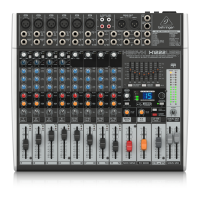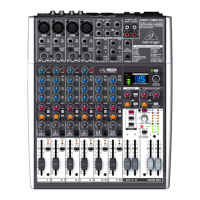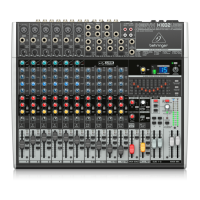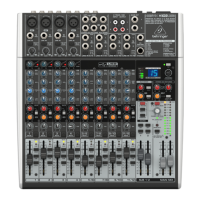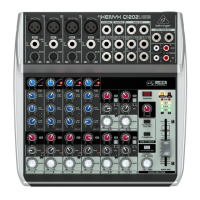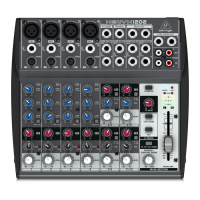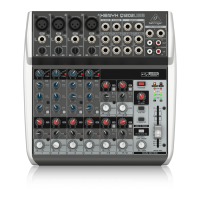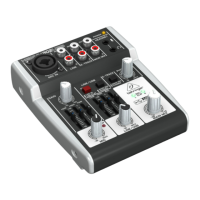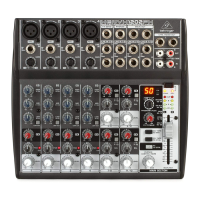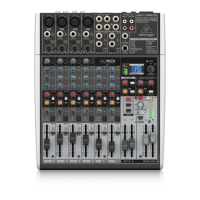4 XENYX X1222USB User Manual
1. Introduction
FBQ Feedback Detection System
The FBQ Feedback Detection System, integrated into the graphic equalizer, is one
of the most outstanding characteristics of this mixing console. This ingenious
circuitry lets you immediately recognize and eliminate feedback frequencies.
TheFBQ Feedback Detection System uses the LEDs in the frequency band faders
of the graphic EQ to indicate the critical frequencies. This way, what once used to
be a labor-intensive search for feedback frequencies is now an activity that even
a child could master.
The microphone channels feature high-end XENYX Mic Preamps that compare
well with costly outboard preamps in terms of sound quality and dynamics and
boast the following features:
• 130 dB dynamic range for an incredible amount of headroom
• A bandwidth ranging from below 10 Hz to over 200 kHz for crystal-clear
reproduction of even the nest nuances
• The extremely low-noise and distortion-free circuitry guarantees absolutely
natural and transparent signal reproduction
• They are perfectly matched to every conceivable microphone with up to
60dB gain and +48 volt phantom power supply
• They enable you to use the greatly extended dynamic range of your
24-bit/192 kHz HD recorder to the full, thereby maintaining optimal
audioquality
“British EQ”
The equalizers used for the XENYX Series are based on the legendary circuitry of
top-notch consoles made in Britain, which are renowned throughout the world
for their incredibly warm and musical sound character. Even with extreme gain
settings these equalizers ensure outstanding audio properties.
Multi-eects processor
Additionally, your XENYX mixing console has an eects processor with 24-bit
A/Dand D/A converters included, which gives you 16 presets producing rst-class
reverb, delay and modulation eects plus numerous multi-eects in excellent
audio quality.
The XENYX mixing consoles are equipped with a state-of-the-art switched-
mode power supply (SMPS). Unlike conventional circuitry an SMPS provides
an optimum supply current regardless of the input voltage. And thanks to its
considerably higher eciency a switched-mode power supply uses less energy
than conventional power supplies.
CAUTION!
We would like to draw your attention to the fact that extreme volumes may
damage your hearing and/or your headphones or loudspeakers. Turn the
MAINMIX faders and the PHONES control in the main section fully down before
you switch on the unit. Always be careful to set the appropriate volume.
1.1 General mixing console functions
A mixing console fulls three main functions:
• Signal processing:
Preamplication
Microphones convert sound waves into voltage that has to be amplied
several-fold; then, this voltage is turned into sound that is reproduced
in a loudspeaker. Because micro phone capsules are very delicate in their
construction, output voltage is very low and therefore susceptible to
interference. Therefore, mic signal voltage is amplied directly at the mixer
input to a higher signal level that is less prone to interference. This higher,
interference-safe signal level has to be achieved through amplication
using an amplier of the highest quality in order to amplify the signal and
add as little noise to it as possible. The XENYX Mic Preamp performs this
role beautifully, leaving no traces of noise or sound coloration. Interference
that could take place at the preamplication level could aect signal quality
and purity, and would then be passed on to all other devices, resulting in
inaccurate sounding program during recording or playback.
Level-setting
Signals fed into the mixer using a DI-box (Direct Injection) or the output of a
sound card or a keyboard, often have to be adjusted to the operating level of
your mixing console.
Frequency response correction
Using the equalizers found in each channel strip, you can simply, quickly and
eectively adjust the way a signal sounds.
Eects mixing
In addition to the eects processor contained in your mixer, using the
insert connectors on the mono channels and both aux busses lets you insert
additional signal processors into your signal path.
• Signal distribution:
Individual signals adjusted at each channel strip are laid out at the aux
sends and returns, and are either fed into external eects processors or fed
back to the internal eects processor. Then, the signals are brought back
into the main mix either via the aux return connectors or via direct internal
wiring. The mix for the on-stage musicians is also created using the aux
sends (monitor mix). Similarly,for example, signals for recording equipment,
power ampli ers, headphones and 2-track outputs can also be taken.
• Mix:
All other mixing console functions fall under this vital category. Creating a
mix means primarily adjusting the volume levels of individual instruments
and voices to one another as well as giving them the appropriate weight
within the overall frequency spectrum. Likewise, you’ll have to sensibly
spread individual voices across the stereo image of a signal. At the end of
this process, adjusting the level of the entire mix to other equipment in the
signal path is required (e.g. recorder/crossover/amplier).
The interface of BEHRINGER mixing consoles is optimized for these tasks,
enabling you to easily keep track of the signal path.
